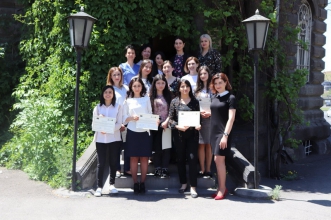Interview with the Head of the Chair Environmental Protection and Nature Management
April 26, 2021
- Why to choose the profession of an ecologist?
- It is not just a profession, it is a conscious choice, a way of life that must be followed conscientiously throughout life.
Today we are faced with the need to preserve the nature of Armenia, to adequately pass it on to future generations and Environmental scientists are called upon to solve the problems of environmental protection and nature management at the national, regional, global levels, as well as the development of national environmental policy in accordance with the principles of sustainable development: ensuring environmental safety.
- Dear Mrs. Sahakyan, who prefers to continue their studies in the specialty "Ecology"? What qualifications are they given after graduation?
- Graduates of various professions - geographers, biologists, chemists, economists, even linguists and journalists continue their master's education at the Department of Environmental Protection and Nature Management. Very often our students are young people who have already passed a certain stage of work and need to complete their professional education or change their profession. In other words, most of them deliberately approach the imperative of pursuing a master's degree.
The graduates of the department are awarded the qualification "Master of Environment" in the specialty "Environmental Protection and Nature Management".
- In what format do the courses of your department take place? What practical training opportunities does the department of the institute provide for students?
- Lectures, workshops, and practical exercises are often used to coordinate the classes. The department employs both theoretical and practical expertise in the same way. Since 2020, the students of the department have the opportunity to conduct research in the unique interuniversity educational and research laboratory ERLEP in Armenia. The laboratory was established within the framework of the Erasmus + MENVIPRO capacity building program “Environmental (Environment) Protection Curriculum for Armenia and Georgia” based on the laboratory capabilities of the EcoCenter of the National Academy of Sciences of the Republic of Armenia. In addition, laboratory research of candidate dissertations is carried out on the basis of the material and technical base of professional resources available in the EcoCenter. Thanks to the selection of master's theses, students have the opportunity to directly participate in the research work of various departments of the EcoCenter.
- What international programs and partnerships do students have access to through the department?
- Since 2017, the department has been implementing programs in the capacity of international credit mobility Erasmus + with the universities of Tuscia, Naples (Italy), and Krakow to increase (Poland).
- How easy is it for graduates of the Faculty of “Environmental Protection and Nature Management” to find a job in Armenia? How much do you support them in this direction?
- At the Environmental Research Center (EcoCenter) of the National Academy of Sciences of the Republic of Armenia, a strategy of recruiting young staff and successful reproduction of scientific potential is always active among students studying at the department. Since 2010, 18 graduates have worked at the EcoCenter, 8 of whom continued their postgraduate studies, 2 of them defended their Ph.D. theses. At the moment, 10 graduates of the Department of Nature Management work in the EcoCenter, who occupy different positions, from laboratory assistant to researcher-scientific secretary.
Furthermore, because of their continuously updated knowledge of different courses that meet the labor market's requirements, graduates of the department are working in state and foreign structures, research centers, laboratories for environmental monitoring, and environmental expertise. As already mentioned, many of our students are already entering the master's program on request for their further development, and I think that they are doing it.
- What problems and development opportunities do ecologists face today?
- One of the most important tasks that ecologists are facing today is a comprehensive study and overcoming of national and global challenges, the development of a common benchmark.
Issues of existing subsoil use, environmental protection, shortcomings in environmental management, circular economy, and other national environmental issues are the most pressing, and they must be resolved by environmental impact assessment, environmental impact assessment, and recognition. Everyone who makes decisions today should know be aware of potential environmental problems and make decisions based only on sustainable development, ensuring the principles of balance between man and nature equality of generations. The Master of Science in Environmental Protection and Nature Management gains basic applied knowledge.
- What advantages do your graduate students have over students in related fields at other universities?
- The graduate student of the department have the opportunity to take modernized courses using advanced national and European experience, conduct research in the unique interuniversity educational and research laboratory ERLEP in Armenia, as well as participate in international programs, continue their studies or take a professional internship at the best European universities. Postgraduate students have the opportunity to study in an academic environment, have world-renowned teachers who are current scientists, and be directly involved in the implementation of various research projects. Graduate students have been given every opportunity to continue their studies at the tertiary level of education, to ensure the continuity of their research work, and to work in a scientific organization later.
